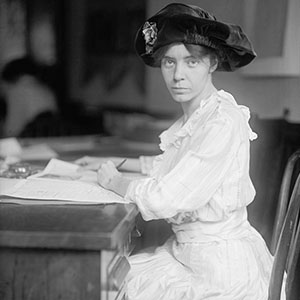Alice Paul was one of the most influential women’s rights activists of the 20th Century. As a key leader of the U.S. suffragist movement, Paul was instrumental in the ratification of the Nineteenth Amendment to the U.S. Constitution, which officially extended the right to vote to women.
Early Life
Alice Stokes Paul was born on January 11, 1885 in Mt. Laurel, New Jersey. She was raised a Quaker, which instilled a strong belief in gender equality. As Paul noted years later, “When the Quakers were founded…one of their principles was and is equality of the sexes. So I never had any other idea…the principle was always there.” Paul’s mother was also a member of the National American Woman Suffrage Association, and Alice often attended suffrage meetings with her.
Paul graduated at the top of her class from Moorestown Friends School and later graduated from Swarthmore College, which her grandfather had helped found. Paul lived in England from 1907 to 1910, studying social work. During her time in England, she met and befriended Christabel Pankhurst whose mother, Emmeline Pankhurst, was a radical suffragette. After returning from England, Paul attended the University of Pennsylvania, where she earned a Ph.D. in sociology.
Nineteenth Amendment
Paul dedicated her life to the American suffrage movement and women’s equal rights. After working within the National American Woman Suffrage Association (NAWSA), Paul cofounded the Congressional Union, which advocated for a constitutional amendment guaranteeing women the right to vote. In 1916, Paul founded the National Woman’s Party (NWP). Members of the NWP, known as “Silent Sentinels,” protested outside the White House, aiming their attacks directly at President Woodrow Wilson.
The suffragists continued their protests even after the U.S. entered World War I. They were often were arrested and imprisoned. In response, Paul and her colleagues engaged in hunger strikes, which were met with forced feedings by law enforcement. The suffragists’ protests and mistreatment at the hands of authorities drew national attention. It also persuaded President Woodrow Wilson to support the suffrage movement.
In 1919, both the U.S. House of Representatives and Senate passed the 19th Amendment, which states: “The right of citizens of the United States to vote shall not be denied or abridged by the United States or by any State on account of sex.” On August 18, 1920, Tennessee became the last state needed to ratify the 19th Amendment.
Paul went on to fight for passage of the Equal Rights Amendment, which she co-wrote with Crystal Eastman. While she was unable to secure constitutional equality for women, she successfully fought to have women included as a protected group under the Civil Rights Act of 1964. Paul died at the age of 92 on July 9, 1977.








